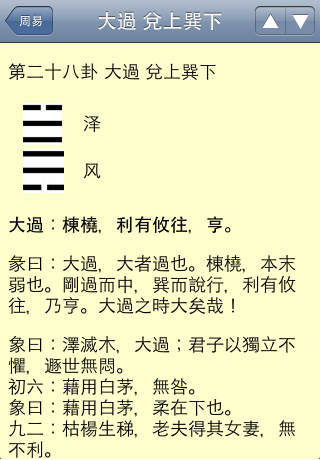
Traditionally it was believed that the principles of the I Ching originated with the mythical Fu Xi (伏羲 Fú Xī). In this respect he is seen as an early culture hero, one of the earliest legendary rulers of China (traditional dates 2800 BCE-2737 BCE), reputed to have had the 8 trigrams (八卦 bā gùa) revealed to him supernaturally. By the time of the legendary Yu (禹 Yǔ) 2194 BCE–2149 BCE, the trigrams had supposedly been developed into 64 hexagrams (六十四卦 lìu shí sì gùa), which were recorded in the scripture Lian Shan (《連山》 Lián Shān; also called Lian Shan Yi). Lian Shan, meaning “continuous mountains” in Chinese, begins with the hexagram Bound (艮 gèn), which depicts a mountain (¦¦|) mounting on another and is believed to be the origin of the scriptures name.
Notice:language only support chinese.
《周易》中運用八卦預測信息的方法的發明,正是我國人民具有唯物主義世界觀的真實寫照,他們在實踐和好地認識社會、改造社會、推動社會不斷的向前發展。所以,易卦及《周易》,是個儲存量很大的信息庫。
《周易》歷經數千年之滄桑,已成為中華文化之根。易道講究陰陽互應、剛柔相濟,提倡自強不息、厚德載物。在五千年文明史上,中華民族之所以能夠久歷眾劫而不覆,多逢畏難而不傾,獨能遇衰而復振,不斷地發展壯大,根源一脈傳至今,是與我們民族對易道精神的時代把握息息相關的日常生活中遇到的疑難之事,不是求助於偶像,而是運用通過八卦今昔信息預測的科學方法,預測自然和人事吉凶方面的有關信息,對一切做到心中有數,有備無患,從而更。
《周易》是一部古老而又燦爛的文化瑰寶,古人用它來預測未來、決策國家大事、反映當前現象,上測天,下測地,中測人事。然而這只是古人在未掌握科學方法之前所依託的一種手段,並不是真正的科學。雖然有些理解與科學相符,那是因為這個理解正好有科學合理性,但就不能因為說它是科學的。只能當它是一種文化。
目前,我國的易學研究在原理探索上仍無重大進展,理論研究停步不前,思想混亂,實際應用容易趨向神秘主義。上述狀況嚴重歪曲了易學的學術地位,阻礙了中華易學良性化發展的步伐,蒙蔽了易學的真正價值。


